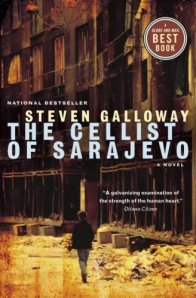The Cellist of Sarajevo


I don’t read a lot of fiction. However, a gift card to Chapters/Indigo gives plenty of motivation to find some and expand my horizons. On Saturday, one of the books I picked up was Steven Galloway’s The Cellist of Sarajevo. I picked it up after browsing through another book, Yann Martel’s What is Stephen Harper Reading? Martel sent the Prime Minister The Cellist with high recommendations. If it’s good enough to be sent to the PM, it’s good enough for me.
It’s a captivating read about life in Sarajevo during the siege of 1992-1996. A sniper is assigned to protect a cellist who goes out everyday for 22 days to play Albinoni’s Adagio at the site of a mortar strike that killed 22 people. The novel follows the lives of three people (including the sniper), whose lives somehow intersect or just barely fail to intersect with the cellist.
There is no vertical dimension in this book whatsoever. God is conspicuously absent in this war zone — so much for the old saying about foxholes. I wonder if this was deliberate on the part of Galloway: no churches, no God, no religious consciousness. Imagine. Is this the consequence of the siege or its cause? Nevertheless, the author does explore important ethical themes and questions of what it means to be human. Specifically, the theme of hatred appears repeatedly. Why do those laying siege hate those who are besieged? Why do so many of the besieged return the favour? What does it take to put hatred to death in these circumstances? These are great questions.
The Cellist of Sarajevo is a fascinating look at a sorry time and place. Readers who enjoy war yarns will find themselves shaken and stirred. It’s not a glorification of war and there are no heroes. Instead, this novel reflects many of the psychological complexities of warfare and those struggling to survive in the midst of it.


